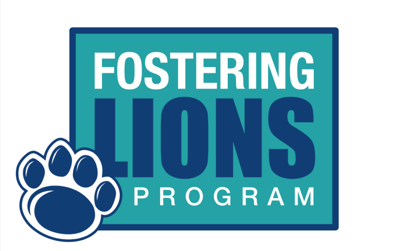Penn State’s Fostering Lions Program, which operates through the Child Maltreatment Solutions Network, provides support for foster youth in postsecondary education. Students who are in or have been in foster care or have experienced homelessness in their youth involved with Children and Youth Services are eligible for the program.
Cheri McConnell, the coach of the Fostering Lions Program, has worked with the program since its start in fall 2018 and has been working for the solutions network since 2016. McConnell said the program has “doubled since last spring,” with around 50 students involved.
“Helping students navigate and be successful at Penn State is our No. 1 goal,” McConnell said. “But to me, my students are also people, so I’m concerned about their mental and physical health, grade status and every other aspect of their lives.”
McConnell said the program assists students financially, academically, socially, emotionally and logistically. The goal of the program is to increase educational outcomes, college retention, graduation rates, GPAs, and personal societal contributions, while decreasing public health costs and economic disparity in foster care students, according to McConnell.
“Whenever I meet students, I tell them I have two goals for them — one is that they have fun while they’re at college because this is a great experience for them because the obstacles that they had to overcome to get to this point are huge, and I’m so proud of each and every one,” McConnell said. “Two is that they do well and graduate so I can come cheer them on at graduation.”
MORE CAMPUS COVERAGE
Penn State alumnus Robert Boyce always wanted to write a Western novel complete with action …
McConnell said she acts as a point of contact between Penn State’s commonwealth campuses. Each campus has a Fostering Lions Program representative students work with directly at all the campuses.
“I’m only able to go once a year to see my students in person at the commonwealth campuses and take them to lunch because food is always a great incentive,” McConnell said. “No one knows their campus better than each of my points of contact, so unless a student tells me they personally need my support in person, I only have the time to go once a year.”
The program hosts a Supper and Seminar Series once a month, a “fun” event both in the fall and spring, lunch with McConnell monthly at University Park and monthly Zoom meetings with all the campuses, according to McConnell.
“It keeps me seeing them, and it keeps them engaged outside of my one-on-one visits with students,” McConnell said. “It’s also great to have these students learn about all of the resources available to them and build relationships with each other.”
McConnell said she is “thankful” for the support of the community and hopes to expand Fostering Lions to add a mentor program to help students “grow professionally.”
“I am here as an extension of the services and support they have had in the past and to help them navigate Penn State — whether that be conversations about their mental health or accessing their LionPath to help them determine how to fill out different paperwork,” McConnell said. “Being a student is one part of their lives that I’m able to be a part of.”
Jennie Noll, director of the Child Maltreatment Solutions Network, has overseen the program through her role at the network and said the network came after former Penn State football defensive coordinator Jerry Sandusky’s sex abuse case.
“The network came about after the wake of Sandusky as an academic response to solve a complex issue of child maltreatment,” Noll said. “I was fortunate enough to be brought to Penn State at the time to lead that initiative.”
MORE CAMPUS COVERAGE
Summer at Penn State is in full swing. And with it, a new, decreased set of coronavirus guid…
Noll said even though the Fostering Lions Program was created after the solutions network’s origin, “seeing the program work and its success makes it motivating to continue the work it’s doing.”
“It’s most rewarding when you see someone that could go to college and graduate and then go and do just that,” Noll said. “When you see someone’s eyes light up when they realize they have the resources, the drive and the support to make it work, it is so rewarding.”
Noll said the Child Maltreatment Solutions Network offers various undergraduate student opportunities, such as research and volunteering.
“Any student can get involved and be a volunteer because there’s a lot that we do to have outreach to high school students,” Noll said. “Some foster students don’t know their potential or think they can go to any of Penn State’s campuses.”
Jonathan Boyd recently became involved in the program at Penn State Schuylkill. Boyd (freshman-business management) said he first heard of the program after he asked Penn State Admissions a question via email, which led him to McConnell.
“After hearing from Cheri and about the benefits of the program, I figured this would be the best option for me,” Boyd said. “So far it’s been very helpful because Cheri keeps me on track with things I need to turn in and helps me along the way.”
Boyd said he is looking forward to meeting more students in the program through events in the fall semester and has “already felt comfortable” with the program before the fall semester begins.
“My favorite part of the program is just having an extra support person and knowing that if I need something, someone is always in my corner to help me out,” Boyd said. “This is a great opportunity for kids like me in this situation — it’s great to have someone that wants us to do well and will help us get what we need.”
MORE CAMPUS COVERAGE
Penn State employees are now able to travel domestically without unit executive approvals, a…








